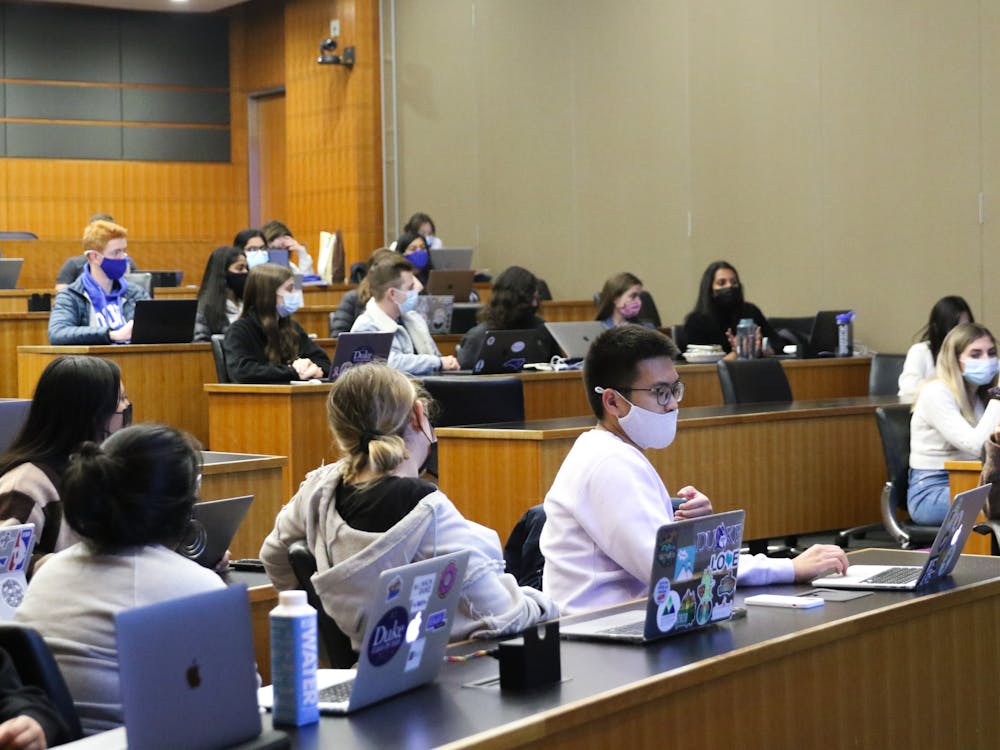With an abundance of acronyms from DSG to DSGJ to SOFC, it can be confusing to understand all that the University’s student government and its branches do. This guide breaks it all down for you.
At the center of Duke
From advocating for student concerns and needs to designing the Blue Devils Buddies mentorship program, Duke Student Government serves as the key student leadership organization for the undergraduate community.
DSG connects the student body with various services and resources. It aims to foster communication between students and administration.
DSG President Lana Gesinsky, a senior, oversees the operations of the executive, legislative and judicial branches. Executive Vice President Devan Desai, a senior, and Chief of Staff Hana Hendi, a senior, work closely with Gesinsky on the executive team. The DSG Senate consists of five committees—academic affairs, campus life, Durham community affairs, equity and outreach, and services and sustainability.
The Senate workshops various policies and programs at their weekly meetings, which take place Wednesdays at 7 p.m. in the Fitzpatrick Building in Schiciano Auditorium. These meetings are open for any student to attend.
Students will elect first-year senators in late September. At-large applications open to first-years are due on Sept. 28, with interviews in October.
This year, DSG will be “rolling out a new mentorship program so [students] can observe and try out DSG before [they] join and run,” Gesinsky said.
In addition to DSG, there is also the Engineering Student Government, who serve Pratt School of Engineering students, and the Graduate and Professional Student Government.
Protecting students’ rights
The DSG Judiciary is “committed to serving, protecting and defending students’ rights.” In order to ensure that DSG and registered student groups follow DSG’s constitution, bill of rights and bylaws, the DSGJ can “conduct investigations, subpoena evidence and witnesses, settle group disputes and discipline student groups.”
The judiciary contains a chief justice, associate justices, clerks and the office of public advocacy. Potential cases the judiciary addresses include contested elections, K-ville policy conflicts and impeachment and/or removal of DSG officers or student group leaders.
The judiciary has a quiz available on their website to determine if students should file a petition to DSGJ.
After filing a petition, the judiciary reviews it and may grant a hearing or resolve the petition through analyzing written arguments.
Gathering data
DSG Research Unit (DSGRU) uses a quantitative approach using data and statistics to address campus issues. It reports results to student government representatives for further action. Students can apply to be a DSGRU investigator.
DSGRU has two branches: an internal unit, which researches pressing issues and creates short-term surveys that inform DSG senators’ projects, and an external unit, which researches larger-scale topics to “track the effectiveness of current and planned University-wide initiatives.”
Funding it all
The Student Organization Finance Committee (SOFC) is a group within DSG that supports and funds the needs of 350+ student organizations. Decisions for funding are based on line-item requests, without review of the specific organization.
For student organizations, there are two SOFC fund tracks: recognized and chartered. Chartered organizations cannot be selective or charge dues. They can access funds from the SOFC programming fund, dPS service engagement fund, UPB Bassett fund and CMA cultural engagement fund. They can also access funds from the SOFC annual budget.
Recognized organizations cannot access funds from the annual budget, but may use programming funds. Recognized organizations can also have selective membership and charge dues.
Get The Chronicle straight to your inbox
Signup for our weekly newsletter. Cancel at any time.
Amy Guan is a Pratt senior and a senior editor of The Chronicle's 119th volume.

